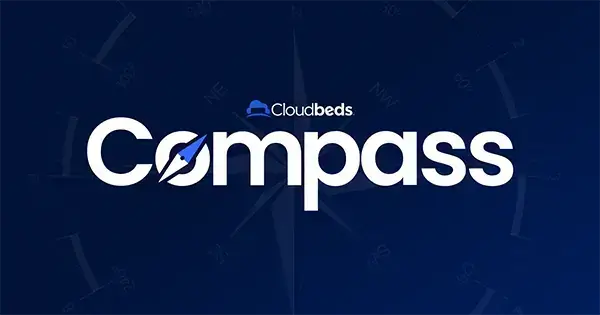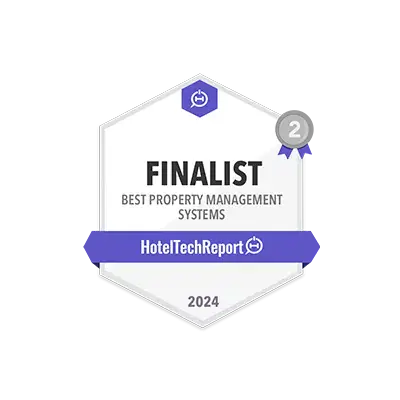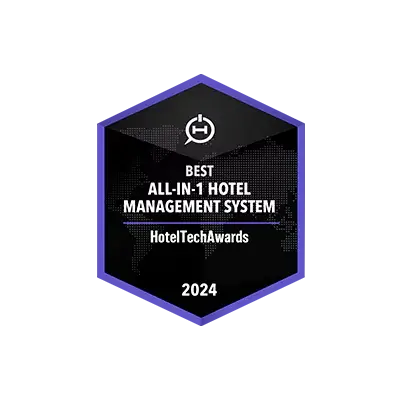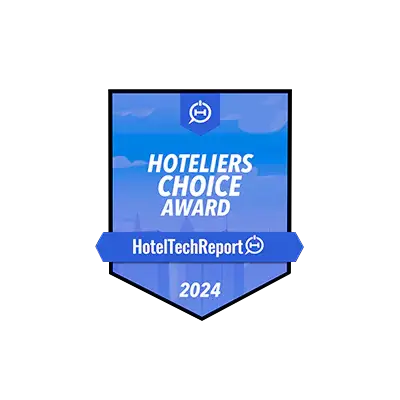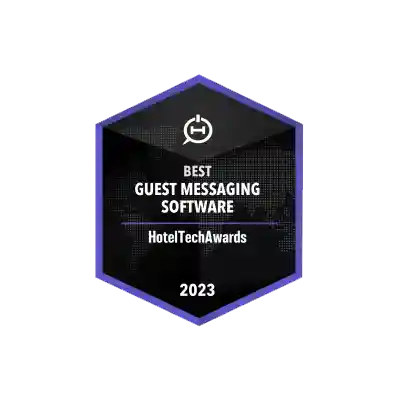
By Cloudbeds
There used to be a time when hotel revenue managers simply had to look at predicted demand and keep an eye on competitors’ rates to optimize pricing.
When travelers booked a hotel room, they had no way of knowing the quality of the guest experience unless they had stayed at the hotel before or knew someone who had. For them, the primary quality indicator was price.
All that changed when online reviews came along.
Online reviews bridged that information gap, creating value transparency and replacing price as the only quality indicator. For revenue managers, that meant adding a new strategy (and a new skill) to their decision-making: reputation pricing.
In this article, we explore reputation pricing, strategies for improving reputation and rates, and technology to help.
But first, listen to Pablo Torres, Adele Gutman, and Paula Carreirão discuss the formula for balancing reviews and pricing to drive optimal results during a recent Cloudbeds Live on ‘Maximizing Hotel Revenue Through Reviews‘.
Reputation pricing uses your hotel’s online reputation as one of the factors influencing rates. As IDeaS explains, reputation pricing aligns your hotel’s room rates with three elements: your guests’ knowledge about the level of experience you offer, their expectations about the value they can get for their money, and their willingness to pay for that value. What is reputation pricing?
How your online reputation impacts pricing strategies
Your online reputation has a significant impact on occupancy and profitability.
Research shows that the more positive reviews a property has, the higher it will rank in search results. This, in turn, leads to more visitors, conversions, and, finally, higher occupancy rates.
Additionally, if guests believe (based on reviews and ratings) that they will get more value from staying at your property, they’ll be willing to pay more for it. Pablo noted during Cloudbeds Live that as long as a hotel fits within a traveler’s budget and is in the right location, they’re likely to splurge and pay a little bit extra to guarantee a positive guest experience. That’s when reputation pricing comes in, allowing revenue managers to increase metrics like ADR (average daily rate) and, ultimately, RevPAR (revenue per available room).
The connection between reputation and rates
Several research studies have confirmed the connection between reputation and rates. One study by Cornell University estimated that a 1-point increase in user review score (on an OTA’s 5-point scale) would allow a property to increase prices by 11.2% without harming its occupancy rates.
In a paper published by the Universidad de Murcia, researchers compared the rates of the hotels ranking #1 on Tripadvisor in four Spanish cities with those of their three direct competitors. The results showed that, in most cases, the top-ranking hotels applied considerably higher rates than competitors for the same room type.
| MADRID | VALENCIA | SEVILLA | BILBAO | AVG | |
|---|---|---|---|---|---|
| 181,29 € | 87,35 € | 182,46 € | 137,99 € | 147,27 € | |
| Hotel ranking #1 | 125,10 € | 86,84 € | 168,81 € | 101,07 € | 120,46 € |
| Avg rate of three competitors | 56,20 € | 0,51 € | 13,64 € | 36,92 € | 26,82 € |
| Avg difference in € | 44,92% | 0,59% | 8,08% | 36,53% | 22,26% |
| Avg difference in % | 93,27 € | 59,01 € | 114,84 € | 83,93 € | 93,64 € |
| Max difference | 93,27 € | 59,01 € | 114,84 € | 83,93 € | 93,64 € |
The impact of negative reviews
While positive reviews will increase your hotel’s expected value, negative ones will have the opposite effect. However, trying to offset that with lower rates is not that simple.
A study by Kelly A. McGuire and Jeannette Ho—included in their book Hotel Pricing in a Social World: Driving Value in the Digital Economy—showed that: “lowering the price of a badly rated and negatively reviewed property provides no additional value in the minds of consumers.” If you have negative reviews, the authors say, you should keep the price up and try to fix the issues that generated them instead.
As a warning to hoteliers, Adele Gutman shared during Cloudbeds Live that just one negative review can turn away 30 guests and noted that AI suggestions have been known to spread negative reviews even if the issue has been addressed. Therefore, hotels must try their best to avoid poor reviews entirely.
6 ways to improve reputation and increase rates simultaneously
The goal of reputation pricing is to understand your perceived value and increase it over time. This process involves not only revenue managers but also marketing and operations teams.
Here are six steps to follow to increase your reputation and rates:
1. Understand your online reputation
You can’t do anything until you understand your perceived value in the market. To do this, collect and analyze guest feedback and perform a sentiment analysis to see where you stand. Consider both direct and indirect feedback as part of your analysis.
Direct feedback includes:
- Hotel guest responses to email surveys
- Feedback collected directly by staff
- Ratings and reviews left on OTAs (online travel agencies like Booking.com) and other external channels (like Google)
Indirect feedback includes:
- Mentions of your hotel on social media
- Loyalty program participation
- Conversion rates on metasearch campaigns
- Conversion rates on your hotel’s website.
2. Know your competitors’ reputation
A good reputation is not enough to charge more; you must offer more value than the competition to push the price. Ensure you understand the value (and shortcomings) of your competition and amplify how you deliver a better experience.
For example, if your competitor’s guests are complaining about the continental breakfast being underwhelming, make sure you advertise your award-winning dining experience with pictures and detailed descriptions on your profiles.
3. Know your guests
The other side of the equation for assigning value to your reputation is your customers’ willingness to pay, which can be different depending on property type (hostel, luxury, boutique), guest segment (leisure, business), or booking source (corporate/consortia, travel agency vacation packages).
Pablo shared that he recently spoke to the General Manager of an independent hotel that leverages group business in the winter since capacity is lower. Therefore, it’s unlikely that the hotel will receive noise complaints or other negative feedback. In the summer, however, the hotel doesn’t push to have events in case they disturb high-paying transient travelers.
By knowing your segments in and out, you can offer a highly valued guest experience that warrants a higher price.
4. Assign a monetary value to reputation
Utilizing technology, take the data you’ve collected about your reputation, guest segments, competitors, and overall revenue to determine if, based on your hotel’s reputation, you can raise rates.
Knowing your guests’ price elasticity will be crucial to determining the maximum premium you can apply without hurting occupancy rates.
5. Improve your reputation and maintain it
It requires a consistent effort to maintain and improve your reputation. To ensure you climb the ranks and establish your hotel at the top of its category, implement a hotel reputation management strategy that includes the following:
Encourage feedback and respond to reviews. A report by Cornell University found that simply asking for feedback is associated with higher ratings and that responding to reviews leads to improved sales and revenue. Investing in an online reputation management strategy is crucial to establish a positive online reputation.
Know your priorities. Another study by Cornell University, which analyzed the content of over 95,000 hotel reviews, found that consistent service and comfortable rooms are key drivers of guest satisfaction, more than other factors such as location and amenities.
As you try to fix issues highlighted in guest reviews, it’s important to prioritize those operational areas. The study also found that for hoteliers, it’s much better to receive consistently good feedback. Travelers tend to consider excellent reviews mixed with less good ones as red flags, so ensure you offer a consistent experience.
Don’t skimp on the details. A high star rating is not an excuse to ignore guest’s feedback. In fact, McGuire and Ho found that travelers value reviews more than ratings. If you receive a 4-star rating from a guest, but in their review, they mention a minor problem—for example, the shower wasn’t working properly—potential guests are likely to value that detail, so you should too.
6. Use reputation pricing with other strategies
Reputation pricing should be used with other tried and tested hotel pricing strategies, most commonly:
Competitive pricing. Look at the rates of your direct competitors to make sure you’re not charging unreasonably high or low rates.
Demand-based pricing. Vary pricing based on demand, whether it’s actual (bookings already made by guests for a given period) or based on forecasting.
Profit pricing. Determine rates by calculating the hotel’s operating costs and adding the target profit margin.
How technology can help improve reputation and increase rates
Monitoring and managing your online reputation can be challenging, especially because of the sheer number of platforms (OTAs, social media, and metasearch engines) where guests can leave reviews. That’s where technology can help.
Reputation and revenue management systems (RMS) can be integrated with a hotel’s PMS, channel manager, and booking engine to facilitate a reputation pricing strategy. With an integrated system, hotels can gather and respond to guest feedback and update rates across platforms all from one place.
8 top reputation management tools
Here are some of the leading reputation management tools for hotels to streamline the collection and analysis of guest feedback.
Cloudbeds.
Cloudbeds’ new AI-powered review management tool integrates with Google Business Profile to help hotels manage reviews and craft personalized responses. With this tool, lodging businesses can:
- Respond to guest reviews fast
- Utilize AI-generated replies to improve ratings and reputation
- Self-manage reviews all in one place
During Compass, Cloudbeds’ quarterly product webinar, Jeremee Peters, Director of Product, gave a quick overview of how hotels can leverage this tool.
In addition, Whistle for Cloudbeds offers real-time messaging, in-stay surveys, and seamless integration with TripAdvisor, automatically verifying guests’ reviews for authenticity.
Cloudbeds also integrates with the following solutions, giving hoteliers the flexibility to choose the best system for their business.
GuestRevu.
Monitors reviews on Google and TripAdvisor collects personalized feedback from guests, and consolidates it in Cloudbeds PMS.
Hotels Quality.
Allows you to communicate with guests via email, SMS, and instant messages, with a focus on marketing automation and upselling.
myHotel.
Helps reputation management by sending out guest surveys, monitoring online reviews and sending real-time alerts to address issues with guests promptly.
Reputize.
Actively engages with guests during and after their stay, helping you fix issues before they turn into a negative review.
StayFI.
Helps you engage with guests before, during, and after their stay, also by leveraging guest WiFi.
TrustYou.
Uses a proprietary scoring system to assess a hotel’s online reputation and a multi-channel messaging platform to engage with guests and collect guest feedback.
Xperium by RepUp.
Automates review monitoring and ensures 1:1 guest communication on multiple channels from a unified dashboard.
Drive more bookings at a higher ADR
Reputation pricing sits at the intersection of revenue management, sales, marketing, and operations.
Although it requires hoteliers to actively monitor customer satisfaction and manage feedback, it can be an effective revenue management strategy to leverage positive reviews and ratings, driving more bookings at a higher ADR.
To be successful, hotels must understand guest expectations in the hospitality industry, develop a strong online presence backed by positive reviews, and make pricing decisions that align with their perceived value.



